Cruciferous vegetable consumption and the risk of pancreatic cancer: a meta-analysis
- PMID: 25889229
- PMCID: PMC4336706
- DOI: 10.1186/s12957-015-0454-4
Cruciferous vegetable consumption and the risk of pancreatic cancer: a meta-analysis
Abstract
Background: Previous studies regarding the association between cruciferous vegetable intake and pancreatic cancer risk have reported inconsistent results. We conducted a meta-analysis to demonstrate the potential association between them.
Methods: A systematic literature search of papers was conducted in March 2014 using PubMed, EMBASE, and Web of Science, and the references of the retrieved articles were screened. The summary odds ratios (ORs) with 95% confidence interval (CI) for the highest versus the lowest intake of cruciferous vegetables were calculated.
Results: Four cohort and five case-control studies were eligible for inclusion. We found a significantly decreased risk of pancreatic cancer associated with the high intake of cruciferous vegetables (OR 0.78, 95% CI 0.64-0.91). Moderate heterogeneity was detected across studies (P = 0.065). There was no evidence of significant publication bias based on Begg's funnel plot (P = 0.917) or Egger's test (P = 0.669).
Conclusions: Cruciferous vegetable intake might be inversely associated with pancreatic cancer risk. Because of the limited number of studies included in this meta-analysis, further well-designed prospective studies are warranted to confirm the inverse association between cruciferous vegetable intake and risk of pancreatic cancer.
Figures
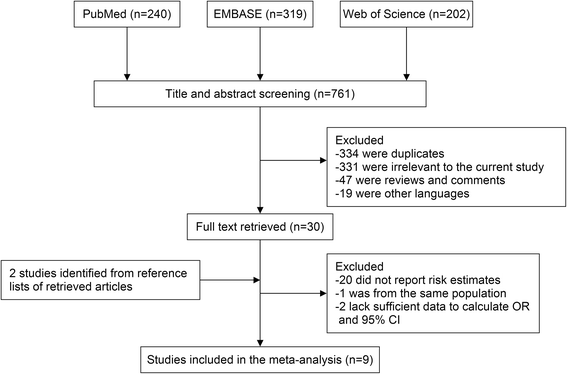
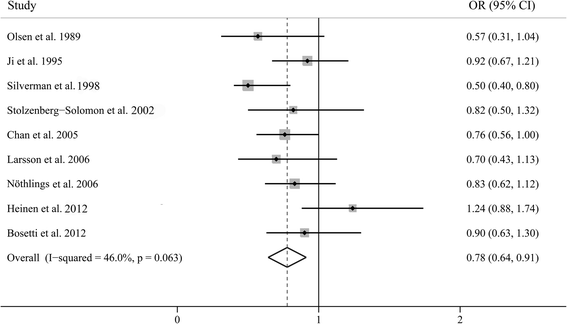
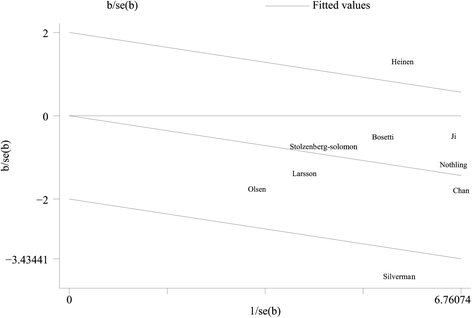
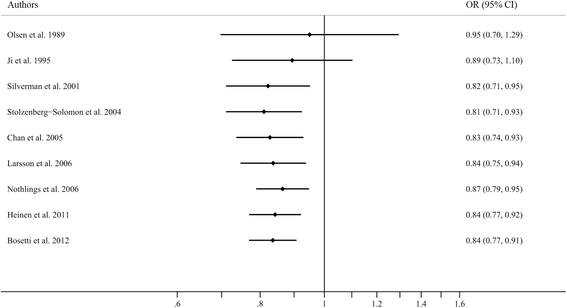
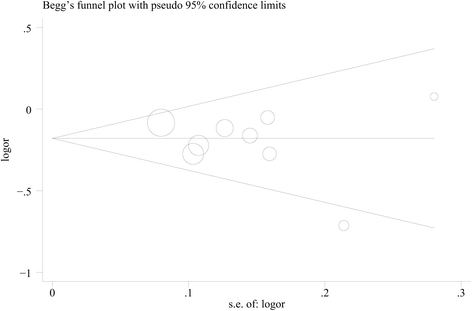
Similar articles
-
Cruciferous vegetables intake is inversely associated with risk of breast cancer: a meta-analysis.Breast. 2013 Jun;22(3):309-13. doi: 10.1016/j.breast.2012.07.013. Epub 2012 Aug 9. Breast. 2013. PMID: 22877795
-
Consumption of fruit and vegetables reduces risk of pancreatic cancer: evidence from epidemiological studies.Eur J Cancer Prev. 2016 May;25(3):196-205. doi: 10.1097/CEJ.0000000000000171. Eur J Cancer Prev. 2016. PMID: 26075658
-
Cruciferous vegetables consumption and risk of renal cell carcinoma: a meta-analysis.Nutr Cancer. 2013;65(5):668-76. doi: 10.1080/01635581.2013.795980. Nutr Cancer. 2013. PMID: 23859034
-
Dietary consumption of cruciferous vegetables and bladder cancer risk: A systematic review and meta-analysis.Front Nutr. 2022 Aug 18;9:944451. doi: 10.3389/fnut.2022.944451. eCollection 2022. Front Nutr. 2022. PMID: 36061884 Free PMC article.
-
Fruit and vegetable consumption and the risk of depression: A meta-analysis.Nutrition. 2016 Mar;32(3):296-302. doi: 10.1016/j.nut.2015.09.009. Epub 2015 Sep 30. Nutrition. 2016. PMID: 26691768 Review.
Cited by
-
Pancreatic cancer: A review of epidemiology, trend, and risk factors.World J Gastroenterol. 2021 Jul 21;27(27):4298-4321. doi: 10.3748/wjg.v27.i27.4298. World J Gastroenterol. 2021. PMID: 34366606 Free PMC article. Review.
-
Sulforaphane promotes C. elegans longevity and healthspan via DAF-16/DAF-2 insulin/IGF-1 signaling.Aging (Albany NY). 2021 Jan 20;13(2):1649-1670. doi: 10.18632/aging.202512. Epub 2021 Jan 20. Aging (Albany NY). 2021. PMID: 33471780 Free PMC article.
-
Cruciferous vegetable consumption and pancreatic cancer: A case-control study.Cancer Epidemiol. 2021 Jun;72:101924. doi: 10.1016/j.canep.2021.101924. Epub 2021 Mar 11. Cancer Epidemiol. 2021. PMID: 33714902 Free PMC article.
-
A suggestion for quality assessment in systematic reviews of observational studies in nutritional epidemiology.Epidemiol Health. 2016 Apr 26;38:e2016014. doi: 10.4178/epih.e2016014. eCollection 2016. Epidemiol Health. 2016. PMID: 27156344 Free PMC article.
-
Allyl nitrile: Toxicity and health effects.J Occup Health. 2017 Mar 28;59(2):104-111. doi: 10.1539/joh.16-0147-RA. Epub 2017 Jan 28. J Occup Health. 2017. PMID: 28132970 Free PMC article. Review.
References
Publication types
MeSH terms
LinkOut - more resources
Full Text Sources
Other Literature Sources
Medical

